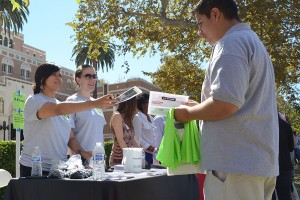Volunteer finds passion in supporting foster care students
USC recently launched a new campus program, Trojan Guardian Scholars, to provide guidance to USC students who have previously been in foster care.

Initiative · Jasmine Torres, a senior majoring in sociology, assists students as part of the Trojan Guardians Scholarship Program. – Photo courtesy of Erica Christianson
“We provide advice and guidance with regard to financial aid and academics, peer group support via a student organization, social events and assistance with campus life including housing options during breaks,” said Wendy B. Smith, clinical associate professor and associate dean for faculty development at the USC School of Social Work.
Smith and professor Jacquelyn McCroskey of the School of Social Work collaborated alongside Dornsife College of Letters, Arts and Sciences Vice Dean for Diversity and Strategic Initiatives George Sanchez to found the program. Sanchez took on the responsibility of leading the TGS program and began to develop it through Dornsife.
“Foster youth currently graduate from college in very small numbers. It is our aim to increase those numbers,” Smith said.
McCroskey gave insight into why it could be harder for students who went through foster care to graduate.
“It is so difficult to do well in school when you are coping with family problems or moving back and forth between foster care placements,” McCroskey said.
There are 33 colleges and universities that are beginning guardian scholar programs on their campuses. Many schools in Southern California have similar campus programs: Guardian Scholars at UCLA, Guardian Scholars at California State University, Fullerton and Guardian Scholars at Pepperdine. Faculty at USC are excited that the university now has its own program.
“I’m delighted that USC will be providing additional support for our exceptional students who overcome the adversities of foster care to join the Trojan Family,” McCroskey said.
The Office of Financial Aid sends TGS informational emails to any student who has identified themselves on their FAFSA form as someone who has been in foster care. TGS is currently composed of nine undergraduate students. According to a recent USC News article, there are approximately 40 foster care students at USC.
Because of the sensitivity of the issue, there is a strong concern for the privacy of the students in the TGS program.
“We have promised them that they do not have to reveal their backgrounds to be part of this group, but rather that it is a support mechanism for them at USC,” Sanchez said.
The program is designed to help support the members so they can successfully graduate from the university, as well as create a stable foundation they can rely on, Smith said.
“Beyond that, it benefits the Trojan Family and the USC community in general by raising awareness about foster care, being responsive to the needs of its community and demonstrating that USC is an educational institution that is welcoming and helpful to those who have been in foster care,” Smith said.
TGS is still in the process of becoming established. The program’s leaders are currently learning what types of assistance involved students want from the program. A volunteer program will also be integrated eventually.
“We do not currently have a program in place that matches volunteers with students. The student organization will be developing its own plan for volunteer involvement,” Smith said.
Many students have expressed interest in being involved in the upcoming program.
“This [would be] a great opportunity to give back to my community and help my fellow Trojans when they need help,” said Anna Rudakova, a sophomore majoring in international relations.
The TGS program wants to inspire students to remember that the Trojan family is always there for support.
“Our new Trojan Guardian Scholars program will make it just a little bit easier for them to succeed while they are here and, even more importantly, to help them use what they learn to make the world a better place after they graduate,” McCroskey said.
Follow us on Twitter @dailytrojan
